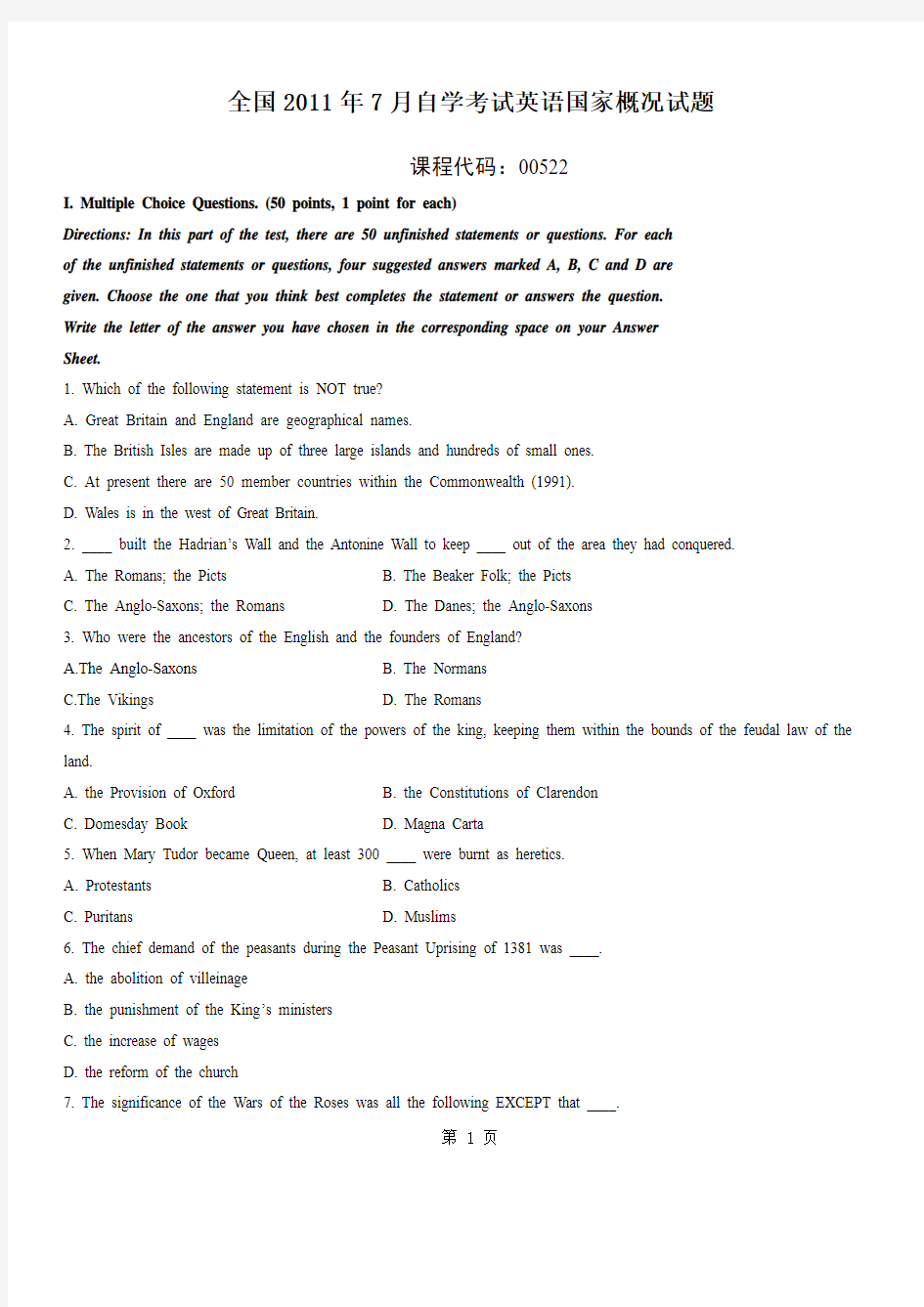
2011年7月自考真题英语国家概况
- 格式:doc
- 大小:42.50 KB
- 文档页数:7


全国2011年7月自学考试英语国家概况试题
课程代码:00522
I. Multiple Choice Questions. (50 points, 1 point for each)
Directions: In this part of the test, there are 50 unfinished statements or questions. For each
of the unfinished statements or questions, four suggested answers marked A, B, C and D are
given. Choose the one that you think best completes the statement or answers the question.
Write the letter of the answer you have chosen in the corresponding space on your Answer
Sheet.
1. Which of the following statement is NOT true?
A. Great Britain and England are geographical names.
B. The British Isles are made up of three large islands and hundreds of small ones.
C. At present there are 50 member countries within the Commonwealth (1991).
D. Wales is in the west of Great Britain.
2. ____ built the Hadrian’s Wall and the Antonine Wall to keep ____ out of the area they had conquered.
A. The Romans; the Picts
B. The Beaker Folk; the Picts
C. The Anglo-Saxons; the Romans
D. The Danes; the Anglo-Saxons
3. Who were the ancestors of the English and the founders of England?
A.The Anglo-Saxons
B. The Normans
C.The Vikings
D. The Romans
4. The spirit of ____ was the limitation of the powers of the king, keeping them within the bounds of the feudal law of the land.
A. the Provision of Oxford
B. the Constitutions of Clarendon
C. Domesday Book
D. Magna Carta
5. When Mary Tudor became Queen, at least 300 ____ were burnt as heretics.
A. Protestants
B. Catholics
C. Puritans
D. Muslims
6. The chief demand of the peasants during the Peasant Uprising of 1381 was ____.
A. the abolition of villeinage
B. the punishment of the King’s ministers
C. the increase of wages
D. the reform of the church
7. The significance of the Wars of the Roses was all the following EXCEPT that ____.
第 1 页
A. feudalism received its death blow
B. the great medieval nobility was much weakened
C. the king’s power now became supreme
D. it dealt a death blow to villeinage
8. ____ is one of the comedies of Shakespeare.
A. Othello
B. Richard III
C. The Tempest
D. Julius Caesar
9. In the Glorious Revolution the Catholic king, ____ was driven out of England.
A. James I
B. James II
C. Charles I
D. Charles II
10. ____, excluding any Roman Catholic from the succession, confirmed the principle of parliamentary supremacy and guaranteed free speech within both the House of Lords and the House of Commons.
A. The Bill of Rights
B. The Disabling Act
C. The Test Act
D. Instrument of Government
11. As a result of the Industrial Revolution, Britain became the ____.
A. “shop of the world”
B. “workshop of the world”
C. “centre of the world”
D. “leader of the world”
12. Which of the following is NOT considered a characteristic of farming in the late 18th and the early 19th centuries?
A. Cultivation of fodder crops
B. Invention of seed drill
C. Selective breeding of domestic animals
D. “O pen-field” system
13. In Britain, ____ abolished “rotten boroughs”.
A. the People’s Charter
B. the Combination Acts
C. the New Power Law
D. the Reform Act of 1832
14. The present British monarch, Queen Elizabeth II was crowned in ____.
A. 1926
B. 1947
C. 1952
D. 1953
15. ____ has the ultimate authority for law-making in Britain.
A. The Monarch
B. The Parliament
C. The Prime Minister
D. The Cabinet
16. In the House of Commons, all speeches are addressed to ____ who is elected at the beginning of each new Parliament to preside over the House and enforce the rules of order.
A. the Prime Minister
B. the Monarch
第 2 页